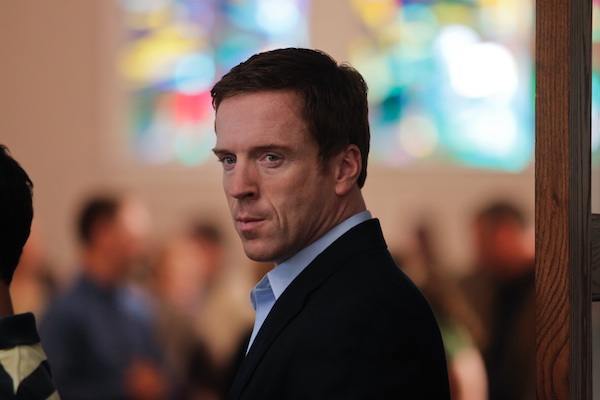Damien Lewis as Nicholas “Nick” Brody in Homeland, episode four, “Semper I.” Photograph by Kent Smith, courtesy of Showtime
“Semper I” was the title of this week’s Homeland episode, but “Semper Spy” might have been more fitting. Almost every character (with the exception of Dana, who only had enough screen time to roll her eyes once or twice) does some morally ambiguous sleuthing in episode four: Brody watches his wife from the safety of the garage; Jessica busts into her daughter’s room uninvited; Estes (who we now know did some very unorthodox recon work in Carrie’s bedroom) assigns a newbie CIA analyst to keep an eye on his former flame; and Carrie, as usual, abandons all pretense of a personal life to stalk Brody after hours. If Avenue Q taught us that everyone’s a little bit racist, maybe Homeland is here to tell us that we’re all spies when the opportunity presents itself. Who, after all, has never snooped in a sister’s diary or surreptitiously checked a boyfriend’s open e-mail account? Illegal surveillance equipment and warrantless wiretaps, not so much, but that’s what rogue CIA agents are for.
“Semper I” opens with Carrie doing something the audience never expected her to: eating food. An apple and a muffin, to be precise (clearly Virgil’s cooking last week inspired her). She’s watching Brody, who’s toweling himself off after a shower, and she averts her eyes a little bit but not really all that much. Brody jumps when he thinks he sees an image of Abu Nazir in the mirror, prompting Carrie to write “More paranoid hallucinations?” on a legal pad. Presumably, with the antipsychotic green pills and all, she should know. We get the sense that Carrie’s becoming oddly attached to Brody—she laughs to herself when he can’t find his tie, with the easy familiarity of someone who knows him fairly well. Which is one of the strangest things about surveillance: For weeks Carrie’s watched Brody eat, sleep, and interact with his family, and he has barely a clue who she is.
Brody’s off speechifying and playing the good soldier card. He gives the following advice to a group of soldiers: “Friendly fire isn’t. Never lie. Never leave a man behind. And if you pick it, it will not heal.” They laugh. His patriotic American spiel is going down pretty well with the Vice President’s office, which sends a political operative, Lizzie, to the CIA to gauge whether Brody might be a good candidate for public office. “If we look under the hood, what will we find?” she asks Estes, before reminding him that he might be up for the directorship one day, and she might, might, be able to help.
Saul and Carrie have figured out that Lynne’s murder last week had to do with the diamond necklace, and its sale was a transfer of funds to help pay for a terrorist attack. They’re looking into a laundromat where Bin Walid supposedly dropped off the goods (a laundromat? For money laundering? How original) and keeping tabs on all the people going in and out, one of whom is the young Arab man we saw moving into the house at the end of last week’s episode. Carrie, meanwhile, has one day left on her surveillance warrant for Brody, and Saul’s not willing to help her invade the “constitutionally protected privacy of the Brody family” anymore. Looks like her spycam nights are coming to an end.
Mike drops Brody off, and Brody seems suspicious when his friend declines to come in for dinner. “I appreciate you looking out for the family, and for Jessica,” he tells Mike, in an extremely loaded way. “Like you did while I was gone.” Mike replies, “You’d have done the same thing,” to which Brody says, “I’m not sure I would have.” Ouch. In the yard, Jessica and Chris are watching a deer, but Brody seems unimpressed, stating that it’s only going to trample his wife’s tulips (a metaphor for Mike trampling his wife’s something else?). Chris is crestfallen, but his mom says that Dad’s just having a bad day. In the garage, Brody prepares to pray while having visions of his wife in her underwear and waving him off to war. Instead of actually praying, he takes a gun out of a locked box and starts cleaning it.
It’s time for Carrie and Virgil to remove all cameras from the Brody household, even though Carrie isn’t happy about it. While the Brodys go to church (and Dana rolls her eyes and looks bored instead of singing), they get to work, and Carrie has a good snoop, going through Brody’s clothing and rooting around in the garage. She sees his prayer mat, but to her it’s just an innocuous piece of carpet; she also fails to pick up on the significance of the bowl in the sink (#spyinstinctfail). After church, Mike tells Jessica he thinks Brody’s on to them, and Lizzie introduces herself to Brody, proposing that the two of them have lunch (all we have to say about this is that we hope she doesn’t take him to Cafe Milano).
Back at the CIA, Estes takes the time to chat with a young analyst named Danny (Hrach Titizian). Talk turns to Carrie, and to Danny’s goals to become an operative. “I didn’t put you with her by accident,” Estes says. Danny seems to imply he isn’t comfortable . . . you know, spying, to which Estes gives him a meaningful look. “I just need to make sure there are no loose cannons floating around,” he tells the younger man.
Off-duty, Carrie is pointing a night-vision camera at the Brody household, where Brody is washing dishes and being surly toward his wife. Jessica, assuming the worst, goes into Dana’s room to see if her daughter’s said anything about her affair with Mike. Dana says she didn’t, then asks her mom whether her parents are going to get a divorce. No way, Jessica replies. The following day, Carrie and Danny are monitoring their newest target, Raqim Faisel (the guy who likes houses near the airport, played by Omid Abtahi). Faisel, they discover, has made three trips to Pakistan in the last 18 months and is a professor at a local college. Danny takes time to quiz Carrie about her personal life, which means we find out about her former affair with Estes. So that’s what Saul was getting all antsy about when he stated how he wasn’t like all the other idiots in the CIA. “It didn’t end well,” Carrie tells Danny, which may be the understatement of the year.
The pair follow Raqim, which results in a mysterious phone call to Raqim’s wife back at the newly purchased house. “Tell him the traffic is bad on the Beltway,” the voice says; the wife immediately flies into a panic, runs upstairs, and puts an American flag in the window. Raqim sees the flag and drives past his house instead of stopping, from which we can deduce that the spies themselves are being watched. How’s that feel, Carrie? But the two agents have no idea, and after following Raqim to a Moroccan restaurant, they deduce that he’s innocent and scratch him from their suspect list. Carrie, Danny, and Estes go for beers, and we glean the following nuggets of information: (1) Estes was really mad at her when they broke up, and even followed her to New York; (2) he was married; and (3) his wife divorced him, married another guy, and converted to Judaism for him (this could potentially prove important in a future episode, but otherwise it seems pretty random).
The Brodys are having a party. Jess does tequila shots with a friend while Brody glowers in the garage, watching her and polishing his gun again. It’s a little ominous, so when gunshots go off, it’s easy to assume the worst. Turns out Brody shot the deer in the backyard, horrifying his son and pushing his wife past the point of patience. “You fired a weapon! In front of our friends! In front of our son! You barely sleep, you turn your back on us, your frighten our children,” she says. She also mentions their pretty dysfunctional sex life. “We need help,” she tells him. Brody isn’t thrilled but agrees to consider the idea of seeing a counselor. And later in the evening, he tells Jess he’s going to a support group meeting for veterans.
We see Raqim and the woman we assume is his wife, together in their new, diamond-financed home. “There’s no point in imagining the worst,” she tells him. “Our instructions were to sit tight . . . We knew this would not be easy.” The couple are obviously in love (they use pet names like “darling,” and are sweet to each other), but we have to pick a hole in a plot point here. Abu Nazir goes to all the trouble to kill a girl, steal a necklace, and launder the cash, and then the money is spent on . . . a house? How exactly is a house going to spread the message of extremism? We’re fully prepared to be wrong about this, but for now it just seems inefficient—particularly with sky-high housing prices in the metropolitan Washington area, close to the airport or not.
Carrie, frustrated that her surveillance operation is down and convinced that something is up with Brody, stares at a wall for a while and then leaves her apartment abruptly. The next time we see her, she’s trailing Brody to his meeting, where she manages to “accidentally” walk into him and then comes over all coy, pretending she’s just there to talk out her own PTSD and doesn’t want to be seen by him. She leaves, and he follows her out. “What’d you say your name was again?” he asks. The pair engage in what becomes some pretty heavy-duty flirting. “How come it’s so hard to talk about to people who weren’t there?” he asks her, referring to Baghdad. It starts raining and she makes to leave, but he’s sorry to see her go, saying, “Don’t leave me like this. All alone. In the rain.” Pretty romantic for a guy who just shot a deer with a handgun.
So where is this going? We have enough background on Carrie now to know that she isn’t afraid to use sex to get ahead, but with Estes watching her more closely, this could be the beginning of a pretty complicated liaison. Brody, meanwhile, seems utterly smitten with his new CIA friend—and entirely unsmitten with his wife. It’s frustrating that the series delves so deeply into some aspects of coming home from war (especially the more salacious ones) without really exploring in detail the bizarre idea that Jessica and Brody could just pretend to go back to normal after eight years (and countless traumatic experiences) apart. Also interesting? That the couple with the most functional and supportive relationship on this show are possible would-be terrorists.

















